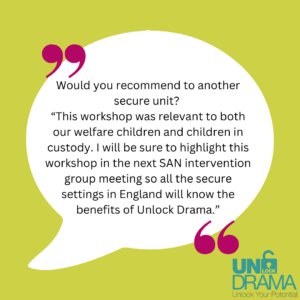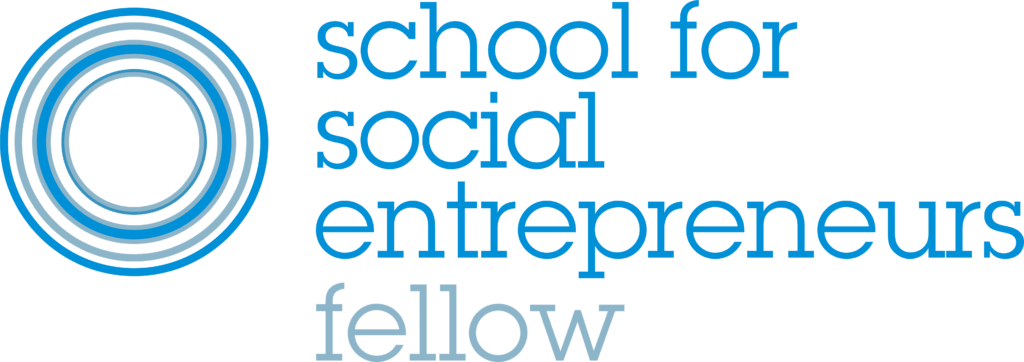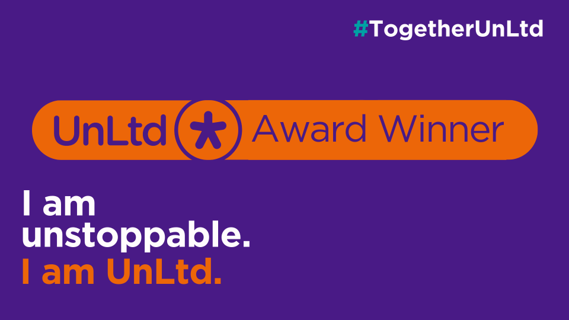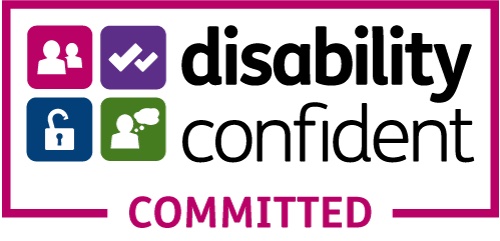Unlocking Confidence and Connection in Secure Children’s Homes
Overview
Unlock Drama delivers specialised, trauma-informed theatre projects to young people in Secure Children’s Homes (SCHs), many of whom face complex emotional, behavioural, and mental health challenges. Our work empowers young people to engage in creative expression, build emotional literacy, and develop pro-social behaviours — often for the first time in a group setting.
Through drama, participants learn to collaborate, reflect on their experiences, and take steps towards change. These projects not only support individual rehabilitation but help build more positive peer cultures within secure settings.
Context and Challenge
Young people in SCHs are often navigating a combination of trauma, neurodivergence, disrupted education, and social exclusion. Traditional interventions don’t always reach them – or resonate.
Unlock Drama offers a different approach:
- Interactive, emotionally safe group settings.
- Creative self-expression without pressure to “perform”.
- A practical and reflective space to explore topics like mental health, violence,
identity, and resilience.
As one young participant shared:
“It’s helped me get more confident. I was nervous in front of people I know – and this showed me I could still do it.”
Our approach
Each Unlock Drama project is tailored in close partnership with SCH staff and mental health teams, with sessions designed to:
- Break down social barriers through warm-up games and trust-building
- Explore key themes through improvisation, storytelling and peer-led performance
- Foster emotional regulation, empathy, and self-awareness
- Ensure every young person is included — regardless of confidence level or communication style
Our facilitators go at the pace of the group, adapting to individual needs while maintaining a structure that feels safe, respectful, and empowering.
Impact: Participant Outcomes
Young people consistently report:
- Increased confidence, social connection, and emotional resilience.
- Willingness to try new things and step out of their comfort zones.
- Deeper understanding of themselves and their impact on others
“It’s a good way of telling people your story — without actually telling your story.”
“I didn’t think I’d act in front of people, but I did.”
“Freedom — ‘cause I was free in the play.”
Notable staff observations include:
- One young person known for isolating himself joined in group games and took the lead in an activity by day three.
- A participant previously reactive to perceived laughter remained calm and playful – a recorded milestone for his personal development.
- A young person made the powerful realisation: “Is this what my victim’s family felt?” – prompting rare and meaningful reflection.
Testimonials from Staff
“Drama allowed them to grow trust and confidence to find their voice. One young person held his temper in a moment that would usually be triggering – this is a major milestone.” – Lincolnshire SCH
“They’ve not worked together like this before. Being in a group and communicating
positively is a massive achievement.” – Aldine House
“It’s a safe way to challenge behaviours and attitudes that led them here. I’d absolutely
recommend this.” – Vinney Green Secure Unit
Why It Matters
Projects like these give young people the chance to:
- Be heard without being judged.
- Practice emotional expression safely.
- See themselves — and each other — in a different light.
- Build key life skills that support future rehabilitation and reintegration
As one participant said:
“Good to be in education – it’s good to be learning something, init.”
Unlock Drama continues to work across SCHs in England, offering preventative, rehabilitative programmes that support the development of healthy identities and build hope for life beyond the system.











